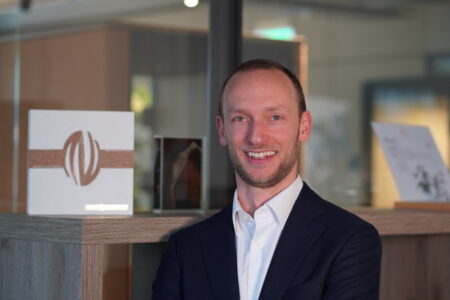Report reveals gains in Barry Callebaut’s sustainable cocoa sourcing

Swiss-headquartered chocolate and cocoa group Barry Callebaut has confirmed that 44% of its ingredients are now sourced sustainably as part of its Forever Chocolate programme, compared against 36% in 2016/2017.
The company has set itself a goal of 100% sustainable sourcing by 2025, with its core goals including lifting more than 500,000 cocoa farmers out of poverty, eradicating child labour from its supply chain, as well as becoming carbon and forest positive.
As the business reported, the results include its Cocoa Horizons programme, as well as its customers’ own programmes and external certification such as UTZ Certified, Rainforest Alliance, Fairtrade and organic. Furthermore, the company sourced 44% (2016/17: 30%) of its non-cocoa agricultural raw materials sustainably. This includes the use of sustainability certification schemes for the respective ingredients.
Speaking to Confectionery Production earlier this year, Bas Smit, head of global marketing said that its global of being completely sustainably sourcing in its operation was a tough goal, but one that was necessary in order to focus its efforts.
Antoine de Saint-Affrique, CEO, commented: “With now 44% of our ingredients coming from sustainable sources we are well on track to make sustainable chocolate the norm by 2025. Through our sourcing, processing and sales, we are driving change, supporting cocoa farming communities and driving the uptake of sustainably sourced chocolate”.
In order to lift farmers out of poverty, the firm announced that it is building datasets with detailed location, agronomic, economic and social survey data on the cocoa farms in its supply chain. More than 130,000 farms have already been mapped. The company said that these unique datasets enable it to ensure that the mapped cocoa farms are not located in protected forest areas. In addition, they allow the group to create tailor-made sustainability programs to help address the key issues of the mapped cocoa farming communities. As part of its work with farmers, the business distributed over 2.1 million young cocoa seedlings, as well as close to 400,000 shade trees.
In 2017/18, 12,395 farmers (+113%) in Côte d’Ivoire, Ghana, Cameroon, Tanzania, Brazil and Indonesia participated in Barry Callebaut’s farm services business, and received coaching and other inputs such as tools and seedlings or support to access finance. Furthermore, the Group supported cocoa farmers in replanting 281 hectares (+60%) with young cocoa trees, as well as other crops that provide shade, and help cocoa farmers to diversify their income.
Eradicating child labour
With the support of ICI, Barry Callebaut continues to implement monitoring and remediation systems designed to eradicate child labor. This constitutes on the ground household and farm visits to survey practices concerning child employment and education in cocoa farming communities. These surveys identify children performing hazardous tasks and allow well-founded estimates of the prevalence of the worst forms of child labor to be made. In 2017/18, the Group conducted monitoring and remediation in 21 farmer groups covering 12,018 farmers in Côte d’Ivoire and Ghana.
The company established that in 2017/18 12% compared to 3.2% in 2016/17 of the farmer groups it directly sources from in Côte d’Ivoire and Ghana have systems in place to prevent, monitor and remediate child labour. The monitoring uncovered 4,230 cases of the worst forms of child labour, in all cases children working on their family’s farm. This increase is the result of the coverage of a broader range of farmer groups. According to the manufacturer, all the cases of worst forms of child labour the group found are being remediated.
As part of its work on this front the business has forged a strategic partnership Dutch impact organisation Tony’s Chocolonely, and retailer Albert Heijn aiming to end child labour and modern slavery in the chocolate industry.
Together, the companies are aiming to set a new industry standard that increases pressure on the wider chocolate industry to drive structural change to work towards a more equally divided cocoa chain.
With a mission to make 100% slave-free the norm in chocolate, for years Tony’s Chocolonely has been calling on companies to follow their example for cocoa sourcing based on direct relations with cocoa cooperatives, traceable cocoa and a living income for cocoa farmers. The company shares full details of its transparent supply chain under Tony’s Open Chain – an open-source platform where chocolate companies can access all the expertise needed to eliminate social issues from their own supply chain. The platform includes tools such as Tony’s Beantracker and the Child Labour Monitoring and Remediation System that has been implemented at all Tony’s partner cooperatives.
Dutch retailer Albert Heijn is the first company to sign up for Tony’s Open Chain, while Barry Callebaut has enabled the partnership with its expertise in processing the segregated cocoa to chocolate. “This is a giant step for the chocolate industry, and an important move towards making sustainable chocolate the industry standard by 2025,” adds Antoine de Saint-Affrique, CEO of Barry Callebaut. “It’s an amazing opportunity to collaborate with both the biggest retailer in the Netherlands and a company as committed to its slave-free mission as Tony’s Chocolonely, and we look forward to expanding this success story through our logistical expertise.”
Carbon and forest positive
In order to become carbon positive, Barry Callebaut said it examines the carbon footprint created by its own operations and energy use, as well as also takes into account the carbon footprint of the entire supply chain, including the production and processing of all raw materials and related land use changes. The carbon footprint of the group’s supply chain from farm to customer was 9.1 million tonnes CO2e in 2017/18. This is an increase of +4.6%2 mostly due to an increase in the production of chocolate and cocoa products. The CO2e intensity per tonne of average product slightly decreased to 4.45 tonnes (-1.5%2) in 2017/18, due to energy-saving measures in its factories and transport operations. Of the Group’s factories, 14 out of 59 (24%) are now running on 100% renewable energy.
The company has created a heat map to provide an overview of the geographical footprint of the raw materials the Group sources which are at risk of causing deforestation, and require additional safeguard measures, in addition to the safeguards provided by certification. On the basis of this heat map, the business is assessing which additional safeguard measures, such as farm mapping, have to be put in place.



